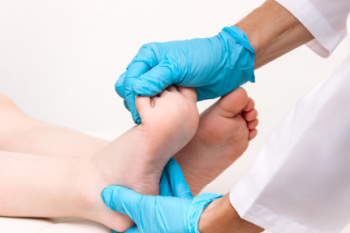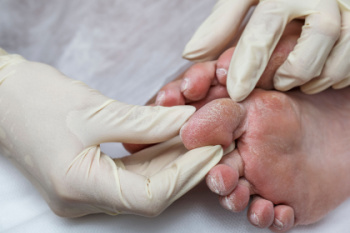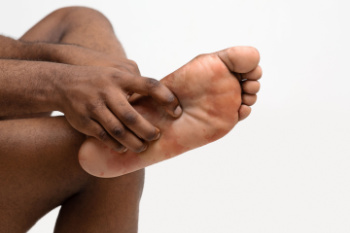Items filtered by date: March 2025
Concerns and Conditions Affecting Children’s Feet

Children’s foot health is essential for their overall growth and development. Common conditions that may affect their feet include bowed legs, flat feet, in-toeing, out-toeing, and curly toes. Bowed legs are often seen in toddlers and usually resolve as they grow. Flat feet, where the arch does not develop properly, may cause discomfort or pain but often improve with age. In-toeing and out-toeing, where the feet turn inward or outward while walking, can be normal in young children but may need attention if they persist. Additionally, curly toes, where one or more toes bend toward others, can cause irritation or difficulty finding comfortable shoes. If your child has any kind of foot condition, it is suggested that you consult a podiatrist who can offer appropriate treatment solutions.
Making sure that your children maintain good foot health is very important as they grow. If you have any questions, contact Dr. Odin De Los Reyes of Connecticut. Our doctor can provide the care you need to keep you pain-free and on your feet.
Keeping Children's Feet Healthy
Having healthy feet during childhood can help prevent medical problems later in life, namely in the back and legs. As children grow, their feet require different types of care. Here are some things to consider...
Although babies do not walk yet, it is still very important to take care of their feet.
Avoid putting tight shoes or socks on his or her feet.
Allow the baby to stretch and kick his or her feet to feel comfortable.
As a toddler, kids are now on the move and begin to develop differently. At this age, toddlers are getting a feel for walking, so don’t be alarmed if your toddler is unsteady or ‘walks funny’.
As your child gets older, it is important to teach them how to take care of their feet.
Show them proper hygiene to prevent infections such as fungus.
Be watchful for any pain or injury.
Have all injuries checked by a doctor as soon as possible.
Comfortable, protective shoes should always be worn, especially at play.
If you have any questions please feel free to contact our offices located in Southbury and Farmington, CT . We offer the newest diagnostic and treatment technologies for all your foot and ankle needs.
What Your Feet Can Reveal About Your Health

The condition of your feet can provide important clues about your overall health. Cold feet may indicate poor circulation, which can be a sign of conditions like peripheral artery disease or diabetes. Persistent foot pain that does not improve with rest may suggest arthritis, nerve damage, or an underlying structural issue. Changes in the nails, including discoloration, thickening, or brittleness, can be linked to fungal infections, nutritional deficiencies, or even thyroid disorders. Additionally, burning foot pain may be a symptom of nerve damage, often associated with diabetes or vitamin B deficiency. Paying attention to these signs and seeking medical advice when necessary can help detect health issues early. If you have any type of foot pain, it is suggested that you consult a podiatrist who can treat various foot conditions, and determine if it is an indicator of additional health issues.
When dealing with systemic disease of the feet, it is extremely important to check the affected areas routinely so that any additional problems are caught quickly. If you have any concerns about your feet and ankles contact Dr. Odin De Los Reyes from Connecticut. Our doctor will assist you with all of your podiatric needs.
Systemic Diseases of the Feet
Systemic diseases affect the whole body, and symptoms usually are displayed in the feet. This condition can make a patient’s ability to walk unbearable. Systemic diseases include gout, diabetes mellitus, neurological disorders, and arthritis.
Gout – is caused by an excess of uric acid in the body. Common symptoms include pain, inflammation, and redness at the metatarsal/phalangeal joint of the base big toe. Gout can be treated by NSAIDs to relieve pain and inflammation, and other drugs that lower the acid levels in the body.
Diabetes mellitus – is an increase in the level of blood sugar that the body cannot counteract with its own insulin. Failure to produce enough insulin is a factor in Diabetes.
Diabetes of the Feet
Diabetic Neuropathy – may lead to damaged nerves and affect the feet through numbness and loss of sensation.
Peripheral Vascular Disease – can restrict the blood flow to the feet, and often times lead to amputation of the feet.
If you have any questions please feel free to contact our offices located in Southbury and Farmington, CT . We offer the newest diagnostic and treatment technologies for all your foot and ankle needs.
What Your Feet Say About Your Diabetes

Your feet might know you have diabetes before you do. Changes in sensation, skin texture, and healing can be early signs of nerve and circulation issues. Many people focus on blood sugar numbers, but overlook their feet. That is, until a problem appears. Diabetes can dull the ability to feel pain, so a small cut or blister can go unnoticed and worsen. Skin may become dry and cracked as nerves struggle to regulate moisture, making infections more likely. Poor circulation slows healing, turning minor wounds into major concerns. Even the shape of your feet can shift over time due to muscle imbalances. Ignoring your feet can lead to serious complications, but daily checks, wearing proper footwear, and regular podiatry visits keep them healthy. If you have diabetes, it is suggested that you include a podiatrist on your health care team.
Diabetic foot care is important in preventing foot ailments such as ulcers. If you are suffering from diabetes or have any other concerns about your feet, contact Dr. Odin De Los Reyes from Connecticut. Our doctor can provide the care you need to keep you pain-free and on your feet.
Diabetic Foot Care
Diabetes affects millions of people every year. The condition can damage blood vessels in many parts of the body, especially the feet. Because of this, taking care of your feet is essential if you have diabetes, and having a podiatrist help monitor your foot health is highly recommended.
The Importance of Caring for Your Feet
- Routinely inspect your feet for bruises or sores.
- Wear socks that fit your feet comfortably.
- Wear comfortable shoes that provide adequate support.
Patients with diabetes should have their doctor monitor their blood levels, as blood sugar levels play such a huge role in diabetic care. Monitoring these levels on a regular basis is highly advised.
It is always best to inform your healthcare professional of any concerns you may have regarding your feet, especially for diabetic patients. Early treatment and routine foot examinations are keys to maintaining proper health, especially because severe complications can arise if proper treatment is not applied.
If you have any questions please feel free to contact our offices located in Southbury and Farmington, CT . We offer the newest diagnostic and treatment technologies for all your foot and ankle needs.
Do Your Child's Feet Hurt?
Stretches That Help With Plantar Fasciitis

Plantar fasciitis results when the thick band of tissue along the sole of the foot becomes inflamed, leading to heel pain and stiffness. Stretching exercises can help relieve this discomfort by improving flexibility and reducing strain on the plantar fascia. A calf stretch can be done by placing both hands against a wall, stepping one foot back, and pressing the heel into the ground while bending the front knee. Holding this position helps lengthen the Achilles tendon and ease tension in the foot. A stair stretch involves standing on a step with the heels hanging off the edge, then gently lowering them to stretch the back of the foot and ankle. A seated foot stretch can be performed by grasping the toes and pulling them toward the shin, which targets the arch directly. Using a towel or resistance band around the toes while pulling upward can also stretch the bottom of the foot. If you are experiencing pain in the heel or on the bottom of your foot, it may be a sign of plantar fasciitis, and it is suggested that you schedule an appointment with a podiatrist for an exam, diagnosis, and treatment options.
Plantar fasciitis is a common foot condition that is often caused by a strain injury. If you are experiencing heel pain or symptoms of plantar fasciitis, contact Dr. Odin De Los Reyes from Connecticut. Our doctor can provide the care you need to keep you pain-free and on your feet.
What Is Plantar Fasciitis?
Plantar fasciitis is one of the most common causes of heel pain. The plantar fascia is a ligament that connects your heel to the front of your foot. When this ligament becomes inflamed, plantar fasciitis is the result. If you have plantar fasciitis you will have a stabbing pain that usually occurs with your first steps in the morning. As the day progresses and you walk around more, this pain will start to disappear, but it will return after long periods of standing or sitting.
What Causes Plantar Fasciitis?
- Excessive running
- Having high arches in your feet
- Other foot issues such as flat feet
- Pregnancy (due to the sudden weight gain)
- Being on your feet very often
There are some risk factors that may make you more likely to develop plantar fasciitis compared to others. The condition most commonly affects adults between the ages of 40 and 60. It also tends to affect people who are obese because the extra pounds result in extra stress being placed on the plantar fascia.
Prevention
- Take good care of your feet – Wear shoes that have good arch support and heel cushioning.
- Maintain a healthy weight
- If you are a runner, alternate running with other sports that won’t cause heel pain
There are a variety of treatment options available for plantar fasciitis along with the pain that accompanies it. Additionally, physical therapy is a very important component in the treatment process. It is important that you meet with your podiatrist to determine which treatment option is best for you.
If you have any questions, please feel free to contact our offices located in Southbury and Farmington, CT . We offer the newest diagnostic and treatment technologies for all your foot care needs.

